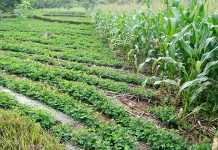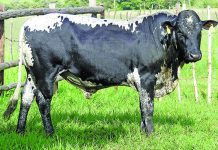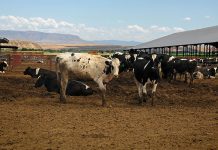Katkop Farm has Been home to the Collett family for four generations. Purchased by Norman Collett in 1923, it’s been managed by his great-grandson since August 2006. But how has each generation prepared the next for this important role? Financial considerations T he first challenges of succession are the financial implications of a change of ownership. In 1985, Godfrey, Norman’s son, split Katkop and sold it to his sons Alan and Hugh bought about a third of Katkop and another farm, Lowlands, which together made up a share of land about equal to Alan’s. took a Land Bank loan roughly matching Hugh’s loan on Lowlands, and paid that money to Godfrey. Thus, the brothers each had second bonds which they ceded to Godfrey, and which have drawn interest over the years.
The capital on the second bond is willed to them on Godfrey’s death. hough a full bond at market rates would have been more cost-effective for Alan and Hugh, this payment has ensured a regular income for Godfrey and his wife Joan, who are both in their eighties, giving the rest of the family peace of mind. In the next generation, Alan and his son Richard have made a different arrangement. They’ve made Katkop a partnership with gradual transfer on a share percentage basis each year. consults with his father on important decisions, especially financial ones. When Godfrey handed over the farm, he knew it was necessary for him to allow his sons their independence. “One of the most detrimental things a father can do to his aspiring-farmer sons is to make them wait indefinitely for possession of the land,” he says. is keenly aware that Godfrey felt his loss of ownership deeply. “In my father’s case, his major interest was farming. Perhaps he should have bought a farm that would have been better suited to his old age, and carried on farming until he couldn’t any more.
” Understanding your family members Where succession is involved, individuals’ personalities must be considered. Godfrey has always been a very hands-on and emotionally involved person. As with many family businesses, relinquishing control over an enterprise you’ve spent a lifetime building can be challenging. H ugh believes succession is easier if parents oversee the process, but allow their successors to run the farm on a day-to-day basis. Not all relationships can work this way. “There needs to be a clear definition of roles. Parents should make provision for their old age and the successors should be very clear about what these provisions are,” says Hugh. Richard adds that having two people in charge of one thing doesn’t work. Personality clashes happen in any relationship, including father-son farming. Despite this, Godfrey has been entirely satisfied with the farm’s progress since his sons took over. “Farming moves with the times. New technology in both animal husbandry and agronomy needs a young, trained mind to make use of its advantages,” he says. Hugh agrees. “I absolutely believe that a man should get control when he’s young and energetic enough.” R ichard’s responsibility is coming at the right time. He says he felt 100% ready to take over, and, by the time he did, he was already running most of the farm. Richard believes work experience is the best way to learn, especially if it’s on the same farm you’ll own. He can also still draw on his father’s mentorship should he need it. “There are times I ask advice about things that don’t happen very often,” he says.
“I may have forgotten something or need reassurance. My father has a wealth of knowledge and experience and I’ll be tapping into it as long as it’s available.” Succession is also about adapting to societal and political changes. Nowadays, the rule of primogeniture, where property was automatically inherited by the firstborn son, has fallen aside, and women and younger children are also eligible to inherit family farms. Contemporary concerns include land reform, labour issues and avoiding dividing farms until they’re no longer sustainable. New generations also have to adapt to a changing economy. Alan, for example, discontinued Godfrey’s prize-winning Red Poll stud, to establish a dairy herd of 150 Friesland cows supplying Woodlands Dairy. Not just a business Hugh believes the succession of a family farm carries tremendous emotional weight. “The farm is often the family home and in some cases has been for generations,” he says. “I also think many people, whether farmers or not, form emotional bonds to land.
This makes it difficult for the person who has ownership of the farm, as he or she can’t make business decisions without taking into account the family’s feelings.” Richard has been lucky, benefiting from the wholehearted support of his sister Liesl and brother Russel. “Our family is fortunate to be in a situation where the farm could be passed on in a relatively hassle-free manner from Dad to Richard,” says Liesl. Russel is also grateful that one day his children will be able to experience just a taste of what it’s like to grow up on a Karoo farm. Hugh’s situation is different, since it seems unlikely that any of his children will actively farm. Instead he’s appointed two managers, splitting their responsibilities. As with any handover there have been challenges, but Hugh has offered incentives and training. He says his most difficult challenge is to accept that others will do things in a different way, and to judge the result and not the method. As urbanisation increases, the emotional question of what to do with the family farms will eventually have to be addressed. Hugh believes this is a decision the whole family will have to be party to. “I think this can be a lot easier if we recognise that, in a way, we can never own land in the way we own other things,” he says. “We’re custodians who only have the use of it for a length of time.” E-mail [email protected],Paula Marais at [email protected], Richard Collett at [email protected], Hugh Collett at [email protected], or Godfrey Collett at [email protected].|fw








